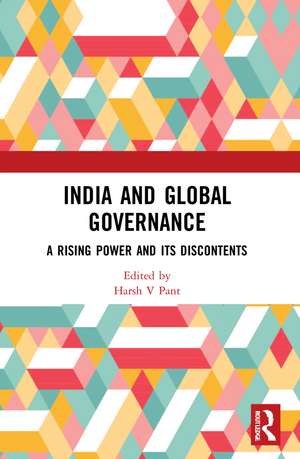India and Global Governance: A Rising Power and Its Discontents
Editat de Harsh V Panten Limba Engleză Paperback – 25 sep 2023
A timely reimagining of global politics, this book will be of great interest to scholars and researchers of politics and international relations, climate change, military and strategic studies, economics, and South Asian studies.
| Toate formatele și edițiile | Preț | Express |
|---|---|---|
| Paperback (1) | 389.66 lei 6-8 săpt. | |
| Taylor & Francis – 25 sep 2023 | 389.66 lei 6-8 săpt. | |
| Hardback (1) | 1001.55 lei 6-8 săpt. | |
| Taylor & Francis – 22 mar 2022 | 1001.55 lei 6-8 săpt. |
Preț: 389.66 lei
Nou
Puncte Express: 584
Preț estimativ în valută:
74.56€ • 78.07$ • 61.84£
74.56€ • 78.07$ • 61.84£
Carte tipărită la comandă
Livrare economică 09-23 aprilie
Preluare comenzi: 021 569.72.76
Specificații
ISBN-13: 9781032224305
ISBN-10: 1032224304
Pagini: 220
Ilustrații: 1 Tables, black and white; 1 Line drawings, black and white; 1 Illustrations, black and white
Dimensiuni: 156 x 234 x 12 mm
Greutate: 0.45 kg
Ediția:1
Editura: Taylor & Francis
Colecția Routledge India
Locul publicării:Oxford, United Kingdom
ISBN-10: 1032224304
Pagini: 220
Ilustrații: 1 Tables, black and white; 1 Line drawings, black and white; 1 Illustrations, black and white
Dimensiuni: 156 x 234 x 12 mm
Greutate: 0.45 kg
Ediția:1
Editura: Taylor & Francis
Colecția Routledge India
Locul publicării:Oxford, United Kingdom
Public țintă
Postgraduate and ProfessionalCuprins
1. Rising India and Its Global Governance Imperatives
Harsh V Pant
Part I: Between a Challenger and a Stakeholder
2. India’s Rise in the Global Nuclear Governance Architecture: Principles, Exceptions and Contradictions
Arka Biswas
3. From Rio to Paris: India in global climate politics
Aniruddh Mohan
4. India’s Pursuit of United Nations Security Council Reforms
Manish S Dabhade
Part II: India and the Liberal Global Order
5. India’s Democracy Assistance: Not Promoting and Not Exporting
Ian Hall
6. India’s Evolving Views on Responsibility to Protect (R2P) and Humanitarian Interventions: The Significance of Legitimacy
Kartik Bommakanti
7. India and Global Trade Governance: Re-Defining Its ‘National’ Interest
Mihir Sharma and Preeti Bhogal
Part III: Shaping new structures of Global Governance
8. BRICS in India’s Vision for Global Governance
Raj Kumar Sharma
9. India’s Subregional Connectivity Initiatives: Re-imagining the Neighbourhood
Harsh V Pant and K Yhome
10. India and Maritime Governance: The Indian Ocean Dynamic
Harsh V Pant and Ivan Lidarev
Harsh V Pant
Part I: Between a Challenger and a Stakeholder
2. India’s Rise in the Global Nuclear Governance Architecture: Principles, Exceptions and Contradictions
Arka Biswas
3. From Rio to Paris: India in global climate politics
Aniruddh Mohan
4. India’s Pursuit of United Nations Security Council Reforms
Manish S Dabhade
Part II: India and the Liberal Global Order
5. India’s Democracy Assistance: Not Promoting and Not Exporting
Ian Hall
6. India’s Evolving Views on Responsibility to Protect (R2P) and Humanitarian Interventions: The Significance of Legitimacy
Kartik Bommakanti
7. India and Global Trade Governance: Re-Defining Its ‘National’ Interest
Mihir Sharma and Preeti Bhogal
Part III: Shaping new structures of Global Governance
8. BRICS in India’s Vision for Global Governance
Raj Kumar Sharma
9. India’s Subregional Connectivity Initiatives: Re-imagining the Neighbourhood
Harsh V Pant and K Yhome
10. India and Maritime Governance: The Indian Ocean Dynamic
Harsh V Pant and Ivan Lidarev
Notă biografică
Harsh V Pant is Professor of International Relations at King’s College London, UK. He is Director, Studies and Head of the Strategic Studies Programme at Observer Research Foundation, New Delhi, India. He is also Director (Honorary) of Delhi School of Transnational Affairs at Delhi University. His current research is focused on Asian security issues. His most recent books include Politics and Geopolitics: Decoding India’s Neighbourhood Challenge (2021), America and the Indo-Pacific: Trump and Beyond (2021), New Directions in India’s Foreign Policy: Theory and Praxis (2018), Indian Nuclear Policy (2018), Handbook of Indian Defence Policy (2015), and India’s Afghan Muddle (2013).
Descriere
This volume explores India’s role in the global governance architecture post-Cold War. It shows how, with a rise in India’s capabilities, there is an expectation from its external interlocutors that New Delhi ought to play a larger global role.
